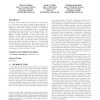Free Online Productivity Tools
i2Speak
i2Symbol
i2OCR
iTex2Img
iWeb2Print
iWeb2Shot
i2Type
iPdf2Split
iPdf2Merge
i2Bopomofo
i2Arabic
i2Style
i2Image
i2PDF
iLatex2Rtf
Sci2ools
GECCO
2007
Springer
2007
Springer
Self-modifying cartesian genetic programming
In nature, systems with enormous numbers of components (i.e. cells) are evolved from a relatively small genotype. It has not yet been demonstrated that artificial evolution is sufficient to make such a system evolvable. Consequently researchers have been investigating forms of computational development that may allow more evolvable systems. The approaches taken have largely used re-writing, multi- cellularity, or genetic regulation. In many cases it has been difficult to produce general purpose computation from such systems. In this paper we introduce computational development using a form of Cartesian Genetic Programming that includes self-modification operations. One advantage of this approach is that ab initio the system can be used to solve computational problems. We present results on a number of problems and demonstrate the characteristics and advantages that self-modification brings. Categories and Subject Descriptors I.2 [Artificial Intelligence]: [Miscellaneous] General T...
Cartesian Genetic Programming | Computational Development | GECCO 2007 | General Purpose Computation |
Related Content
| Added | 07 Jun 2010 |
| Updated | 07 Jun 2010 |
| Type | Conference |
| Year | 2007 |
| Where | GECCO |
| Authors | Simon Harding, Julian Francis Miller, Wolfgang Banzhaf |
Comments (0)

